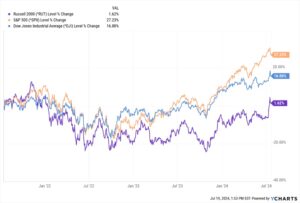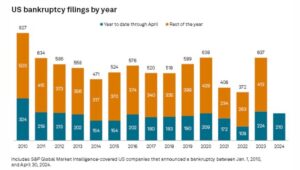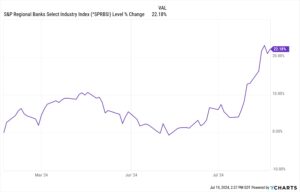What’s Going to Happen?
Joe Biden has stepped aside, which I’ve been predicting (for various reasons) since forever. But what I did not expect was his endorsement of Kamala Harris. The announcement was generally applauded by Big Media, and she received endorsements from many of her Congressional colleagues and commitments from convention delegates before the day was over.
Big Media seems to think that Harris’s nomination is firmly in the bag. So do some of the alternative conservative media. But I’m not sure that matters. As definitive as her position seems to be, there is good reason to believe that things could change between now and the Democratic National Convention in Aug.
So I’m going to make another prediction: that the convention will not be, as it seems likely to be, a rubber stamp of what the delegates are saying now. It will turn into an open convention in which all of them are free to vote for whomever they want.
It’s all a bit complicated, but here’s how it goes…
In the first round of voting:
* Pledged delegates usually have to vote for the candidate they were “awarded to” at the start of the convention.
* Unpledged delegates can vote for any candidate.
* Superdelegates in the Democratic Party cannot vote in the first round of a contested convention. But they can vote in the first round of a convention in which a candidate already has enough delegates through primaries and caucuses to get the nomination.
* In the rare instance that no nominee wins in the first round, the convention is considered “brokered.” The pledged delegates may choose any candidate in later rounds of voting. Superdelegates can also vote in these later rounds.
* Balloting continues until one candidate receives the required majority to win the nomination.
Could this happen in August? I think it can. And I think that if the most powerful Democrats really want to maintain the executive branch for the next four years, they are going to do whatever they can to make it happen.
Here’s why…
Kamala Harris has very little chance of beating Trump on the national stage. Even if she makes a good choice in selecting her VP – a respected politician from a swing state – she has too many weaknesses to overcome Trump’s growing strength.
What are those weaknesses?
Well, for those of you who didn’t believe me when I told you months ago that Biden was too senile to beat Trump (let alone run the country for four more years), you are not going to believe this either.
Harris is just too dumb to compete with Trump. She is ignorant. She is incapable of standing against and defeating Trump – either in debates, on the campaign trail, or even in the Big Media-controlled news.
How do I know? Because ever since she assumed her role as VP, I’ve been watching her perform. Her deficits as a competent leader and a trusted public figure are just as great as Biden’s were. It’s possible that Big Media will try to hide these deficiencies, as they did with Biden, but I’m not sure they will. Despite her blue-ribbon qualifications on the DEI agenda, Big Media knows what the true DNC decision makers know: She doesn’t have what she needs to convincingly answer the questions she will be asked.
And that’s not to mention her public personality. Between the way she presents herself as an entitled soul sister, her embarrassing attempts to portray herself as “of the people,” the well-publicized trouble she has managing her staff, the nonsensical “deep thoughts” she seems insistent on repeating ad nauseam, her complete inability to answer tough questions thoughtfully, and her very unpredictable and inexplicable habit of breaking into cackling laughter at the oddest moments – I don’t see her making a positive impression on undecided voters.
In fact, if she does end up as the Democratic nominee, I think it’s likely she will lose a not insignificant portion of voters that were committed to Biden.
The COPs (Clinton, Obama, and Pelosi) are smart, seasoned politicians. They know that keeping Harris on the ballot is a loser’s hand. Not only is she unlikely to beat Trump on the national stage, it puts the Dems at risk of losing control of the Senate and falling farther behind in the House.
I believe they know that despite the success they had in getting Biden elected in 2020, there is no way they can repeat that success with Harris in 2024.
I first predicted that Biden would step down from the race in Jan. 2023, and I’m predicting now that Kamala Harris will not be the presidential nominee on Aug. 22, the final day of the Democratic National Convention.
This just seems so obvious to me. But maybe there is something I’m missing. Maybe the COPs have a different plan in mind. Maybe they have already given up all hope of maintaining the executive branch and are focusing on bolstering their power in the House and Senate in order to stifle Trump for the next four years and give Gavin Newsom an easy victory in 2028.
I’ve said that I thought Gavin Newsom could beat Trump (especially if he could persuade Michelle Obama to be his running mate). But he recently made a decision that would make it nearly impossible for him to win the country in 2024.
I’m talking about his signing into law a statute that grants the state control over the lives of its citizens’ children. It makes it a crime for any California grammar or high school, public or private, or any teacher in such a school, to notify the parents if their children have said that they are claiming a new gender.
The California school system will continue to mandate classes in gender fluidity for prepubescent children and teens, and will pay for in-school counseling of children who are wondering if the bodies they were “assigned at birth” are not really who they are. But now the state has mandated that all this will go on behind the backs of the parents, with legal consequences, including jail time, for any employee of the school that lets the parents know what sort of possibly life-altering process their child is going through.
If you get your news from the NYT, The Washington Post, or Corporate Media, you have probably heard nothing about this legislation. And if you are inclined to trust the information you get from those sources, you may be inclined to shrug it off as another example of conservatives making a scary mountain out of a perfectly nice little molehill. But most of the rest of the population doesn’t see it that way. A sizeable percentage of voters will see it as downright evil. And my guess is that many of those who are fully supportive of the right to identify one’s gender as one wishes will not support the idea that, when it comes to their own children, they should have nothing to say about it.
So this decision by Newsom was a serious political mistake that could take him out of the running now as a replacement for Kamala Harris. It makes him an easy target for Trump and the Republican Party. They would portray him convincingly as an ideological extremist. And if he tried to defend himself with obscurities and falsehoods, as he’s already been doing since the law was enacted, it wouldn’t help.
If it seems like I’m happy about Biden dropping out and Harris stepping in, you are mistaken. I would much rather see Trump take the victory in the 2024 election. But Trump is in several important ways just as bad as Biden has been. Another four years of Trump in office will result in trillions more dollars of debt for the US, which is already over $33 trillion – an amount that will eventually cause the US dollar to lose its position as the world’s most trusted currency and will make the US, and all its citizens, much, much poorer.
I’ll end with this clip from R.F. Kennedy Jr. – who is running for president too (with only 4% of the population behind him) – explaining what America needs, desperately right now, to get healthy again.









